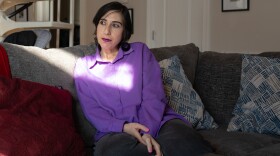On Friday, the U.S. House of Representatives is expected to vote on a bill to keep funding going for a children’s health insurance program that ran out in September. The funding is important – last year in Kentucky, almost 93,000 children were able to go to the doctor with coverage from the Children's Health Insurance Program (CHIP). Congress has to reauthorize the program's funding, and Kentucky is projected to run out of money for these children in March.
But along with this vote to extend funding for five years comes something of a poison pill for legislators who might otherwise vote to extend CHIP. That's because the bill includes a provision to change a provision of the Affordable Care Act which could lead to hundreds of thousands of people losing insurance.
Currently, people who buy health insurance on Healthcare.gov and get financial help have three months to pay their monthly premium if they miss a payment. But the CHIP reauthorization would allow states to shorten that time to 30 days or less.
And while the CHIP part of the bill would allow millions of children to keep their health coverage, shortening that deadline could lead to anywhere from 500,000 to 700,000 people losing their health insurance.
A Trade-Off
If the legislation is enacted as is, it will end up saving the federal government some money. Fewer people enrolled in health insurance through the federal exchange means the government will have to pay fewer tax subsidies to help people pay for coverage. Some people that lose coverage would also likely have to pay a tax penalty for not maintaining health insurance. The Congressional Budget Office estimates the change would save the government $4.9 billion over 10 years.
The trade-off will be a tough call for legislators, according to Dustin Pugel, who works on health care policy at the Kentucky Center for Economic Policy.
“The savings come from roughly 700,000 people being covered in the marketplaces,” Pugel said. “It really is just about cutting the rolls.”
The CBO pointed out that the current three month grace period is crucial for many people.
“Many people who, under current law, would have paid their delinquent premiums during the second or third month of their grace period would instead have their coverage terminated under this bill,” CBO writes.
Nationwide, the Children’s Health Insurance Program gives almost nine million children health insurance. The program is for children whose families earn too much to qualify for Medicaid, which for a family of three is around $20,000 a year. But these families also cannot afford private insurance.
To qualify for CHIP, a family’s income can reach up to about $48,000 a year. Since the program started in the late 1990s, many children have gained insurance. In 1997, 14 percent of children in the U.S. did not have health insurance. That dipped to only 5 percent of children without insurance in 2016.
Pugel said there will be negative consequences if children lose this insurance.
“I think when push comes to shove, they’re going to pass it with or without some of these provisions," he said. "Because the consequences of leaving kids without coverage are both personally catastrophic but politically catastrophic."
But even if the House passes the legislation, it’s still not a done deal. The measure will then head to the Senate, where the Republican majority is narrower. In that chamber there might have to be more compromise because Republicans will need enough votes to pass it.







